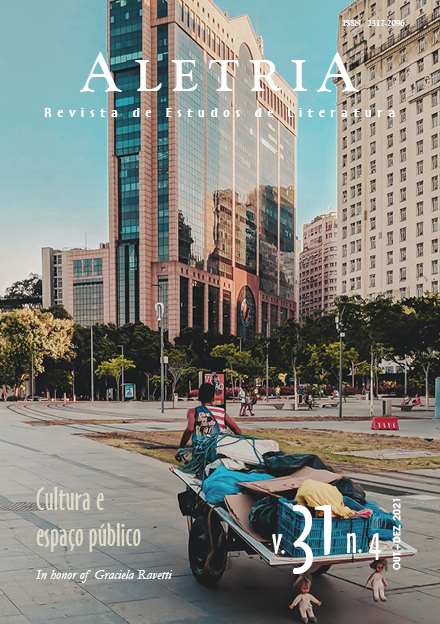Space, Memory and Culture
Narrative Transits in Paulo Lins and Nei Lopes
DOI:
https://doi.org/10.35699/2317-2096.2021.34545Keywords:
Space, memory, culture, narrative, Paulo Lins, Nei LopesAbstract
The article studies the relationship between space, memory and culture and takes as literary references the novels Desde que o samba é samba, by Paulo Lins (2012) and A lua triste descamba, by Nei Lopes (2012). Concentrated in two specific areas in the city of Rio de Janeiro, Cidade Nova, Downtown; and the suburbs of Oswaldo Cruz and Madureira, the two works complement each other in the process of resignification of the urban, physical and memory cartographies that configure a narrative poetics of space. The study has a comparative bias, dialoguing with several other works turned to related themes, while the theoretical framework focuses on the study of some theorists who thematize the relations between public space and culture, such as Bruno Carvalho (2019), Eni P. Orlandi (2004) e Renato Cordeiro Gomes (1994), dentre outros.
Downloads
References
ANDRADE, Mário de. Introdução. In: ALMEIDA, Manuel Antônio de. Memórias de um sargento de milícias. São Paulo: Livraria Martins, 1941. p. 5-19.
BAKHTIN, Mikhail. The Dialogic Imagination: Four Essays. Translated by: Caryl Emerson and Michael Holquist. 19. ed. Austin: University of Texas Press, 2014. p. 331-366.
BARRETO, Lima. Numa e a ninfa. São Paulo: Penguin Classics, 2017.
CANDIDO, Antonio. Dialética da malandragem. In: CANDIDO, Antonio. O discurso e a cidade. 3. ed. Rio de Janeiro: Ouro Sobre Azul, 2004. p. 17-46.
CARVALHO, Bruno. Cidade porosa: dois séculos de história cultural do Rio de Janeiro. Tradução de Daniel Estill. Rio de Janeiro: Objetiva, 2019.
COUTINHO, Eduardo Granja. Velhas histórias, memórias futuras: o sentido da tradição em Paulinho da Viola. 2. ed. rev. e amp. Rio de Janeiro: Editora UFRJ, 2011.
FERNANDA Abreu – Rio 40 graus (videoclipe). [S. l.: s. n.], [20--?]. 1 vídeo (5 min). Publicado pelo canal Fernanda Abreu. Disponível em: https://www.youtube.com/watch?v=AhuJ3dUVQvc. Acesso em: 09 nov. 2021.
FERNANDES, Nelson da Nóbrega. O rapto ideológico da categoria subúrbio: Rio de Janeiro 1858 / 1945. Rio de Janeiro: Apicuri, 2011.
FRANCESCHI, Humberto M. Samba de sambar do Estácio: de 1928 a 1931. São Paulo: Instituto Moreira Salles, 2010.
GOMES, Renato Cordeiro. Todas as cidades, a cidade: literatura e experiência urbana. Rio de Janeiro: Rocco, 1994.
HALBWACHS, Maurice. A memória coletiva. Tradução de Beatriz Sidou. São Paulo: Centauro, 2006.
LINS, Paulo. Desde que o samba é samba. São Paulo: Planeta, 2012. LOPES, Nei. A lua triste descamba. Rio de Janeiro: Pallas, 2012.
LOPES, Nei. O preto que falava iídiche. Rio de Janeiro: Record, 2018. LOPES, Nei. Rio Negro, 50. Rio de Janeiro: Record, 2015.
LOPES, Nei; SIMAS, Luiz Antonio. Dicionário da história social do samba. Rio de Janeiro: Civilização Brasileira, 2015.
O BOTA-ABAIXO. In: ATLAS histórico do Brasil. Rio de Janeiro: Centro de Pesquisa e Documentação de História Contemporânea do Brasil da Fundação Getúlio Vargas, 2016. Disponível em: https://atlas.fgv. br/verbetes/o-bota-abaixo#:~:text=Expressão%20criada%20para%20 designar%2C%20ao,Passos%20(1902-1906). Acesso em: 09 nov. 2021.
ORLANDI, Eni P. Maio de 1968: os silêncios da memória. In: ORLANDI, Eni P. (org.). Papel da memória. 5. ed. Campinas: Pontes, 2020. p. 55-66. ORLANDI, Eni P. Cidade dos sentidos. Campinas: Pontes, 2004.
PÊCHEAUX, Michel. Papel da memória. In: ORLANDI, Eni P (org.). Papel da memória. 5. ed. Campinas: Pontes, 2020. p. 45-53.
POLLAK, Michael. Memória e identidade social. Estudos Históricos, Rio de Janeiro, v. 5, n. 10, 1992. Disponível em: http://www.pgedf.ufpr.br/ memoria%20e%20identidadesocial%20A%20capraro%202.pdf. Acesso em: nov. 2021.
RAMA, Ángel. A cidade das letras. Tradução de Emir Sader. São Paulo: Boitempo, 2015.
SILVA, Mayara Grazielle C. F da. Algumas considerações sobre a reforma urbana Pereira Passos. Urbe: revista brasileira de gestão urbana, [S. l.], v. 11, p. 1-11, 2019. DOI: https://doi.org/10.1590/2175-3369.011. e20180179.
VENTURA, Zuenir. Cidade partida. São Paulo: Companhia das Letras, 1994.
Downloads
Published
How to Cite
Issue
Section
License
Copyright (c) 2021 Paulo Cesar Silva de Oliveira (Autor)

This work is licensed under a Creative Commons Attribution 4.0 International License.
Authors who publish with this journal agree to the following terms:Authors retain copyright and grant the journal right of first publication with the work simultaneously licensed under a Creative Commons Attribution Non-Commercial No Derivatives License that allows others to share the work with an acknowledgement of the work's authorship and initial publication in this journal.Authors are able to enter into separate, additional contractual arrangements for the non-exclusive distribution of the journal's published version of the work (e.g., post it to an institutional repository or publish it in a book), with an acknowledgement of its initial publication in this journal.Authors are permitted and encouraged to post their work online (e.g., in institutional repositories or on their website) prior to and during the submission process, as it can lead to productive exchanges, as well as earlier and greater citation of published work (See The Effect of Open Access).





